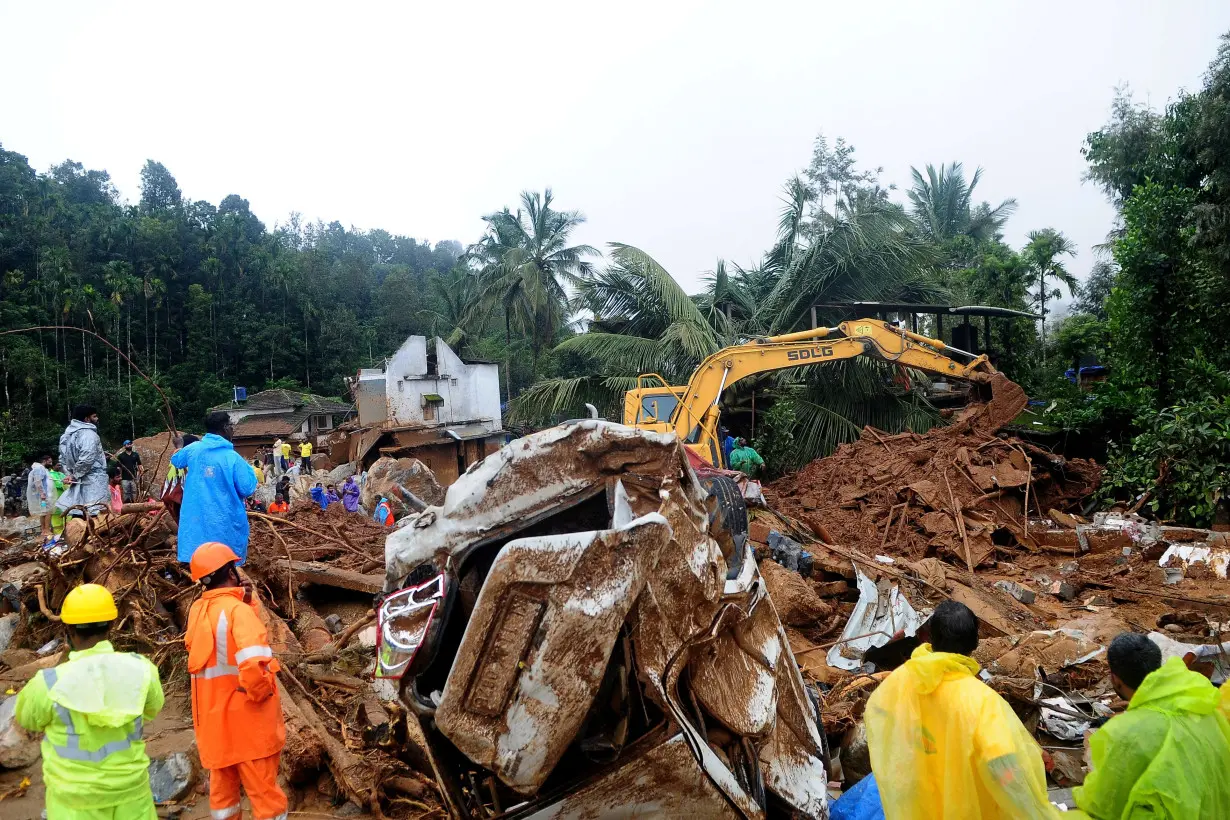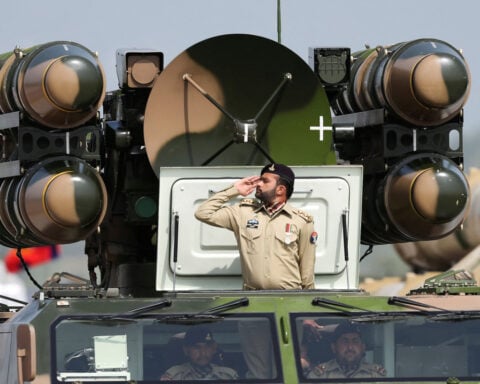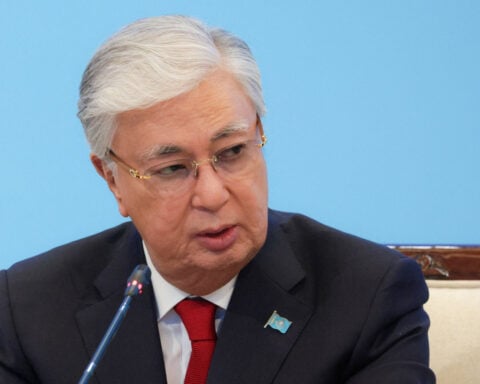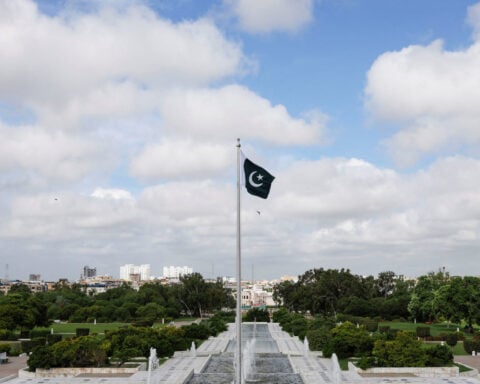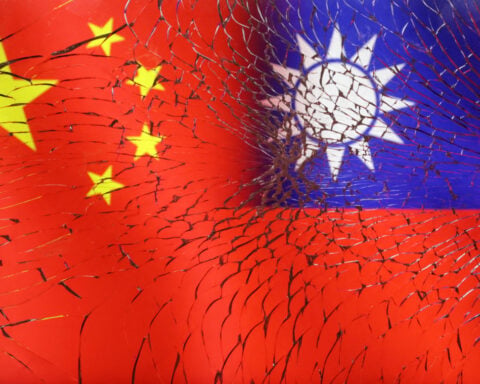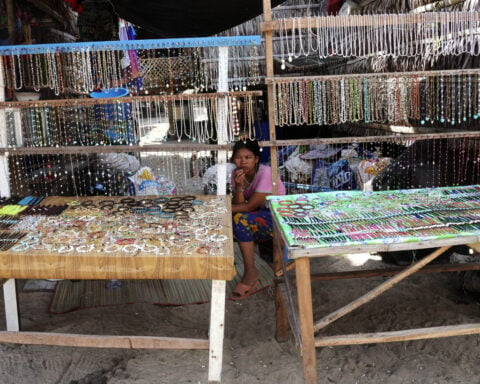By Chris Thomas, Munsif Vengattil and Jose Devasia
KOCHI, India (Reuters) -Landslides swept through tea estates and villages in southern India's Kerala on Tuesday, killing at least 106 people while they slept as unexpected heavy rain collapsed hillsides and triggered torrents of mud, water and tumbling boulders.
The hillsides gave way after midnight following torrential rainfall on Monday in the Wayanad district of Kerala, a state known as one of India's most popular tourist destinations. Most of the victims were tea estate workers and their families who lived in small houses or makeshift shelters.
Television images showed rescue workers scrambling through uprooted trees and flattened tin structures as boulders lay strewn across the hillsides and muddy water gushed through. Rescuers were being pulled across a stream, carrying stretchers and other equipment to rescue people.
At least 106 people were killed in the landslides, 128 injured and dozens unaccounted for, state authorities said. Local Asianet TV put the death toll higher at 119.
Tuesday's landslides are the worst disaster in the state since 2018 when heavy floods killed almost 400 people.
"There are still people who are trapped under the ground and those who have been swept away," Kerala Chief Minister Pinarayi Vijayan told reporters. "The rescue operation will continue with all possible strength and means."
More than 3,000 people had been moved out of the area and accommodated in 45 relief camps in the district, he said, adding that hundreds of personnel, including army soldiers, using drones and sniffer dogs were searching for survivors.
Vijayan, a survivor who gave only one name, said he woke up in the middle of the night to feel the ground shake and see electric poles fall.
"A couple of neighbours and I ran to nearby houses where we heard cries for help and took some of the injured to safety," he told Asianet.
"My father, mother, sister and her daughter were in the house and as I went towards them the next landslide hit with a roaring sound," he said. "I clung to a window bar as I saw my mother and sister disappear under the mud, I couldn't do anything."
"UNPREDICTABLE RAIN"
Army engineers were deployed to help build a replacement bridge after the one that linked the affected area to the nearest town of Chooralmala was destroyed, the chief minister's office said in a statement.
"A small team has managed to cross the bridge across the river and reach (the site) but we will need to send many more to provide help and to start rescue operations," Kerala chief secretary V. Venu told reporters.
A military helicopter managed to land at Mundakkai, one of the worst hit areas where about 250 people were stranded on a hilltop and at a tourist resort without enough food and medicine. They could not be accessed by air earlier due to bad weather, officials said.
This was expected to speed up rescue efforts and the injured would be evacuated first, they said.
Although the area is a well known tourist destination, local residents were the most affected as all tourist excursions had been halted since Monday due to the rain.
Chief Minister Vijayan said that many people had been moved out of the area before the landslides due to the heavy rain and this had helped reduce the toll.
The region was forecast to get 204 millimetres (8 inches) of rainfall but ended up getting 572 millimetres (22.5 inches) over a period of 48 hours, he said, adding that in the wake of "climate change ... rainfall and other natural disasters are sometimes unpredictable".
More rains were forecast across the state for the next five days, he said, and urged people to take precautions.
Opposition leader Rahul Gandhi, who won a seat in Wayanad in the recent general election, but resigned as he was also elected in his family bastion in the north, said he had spoken to the state chief minister to ensure coordination with all agencies.
"The devastation unfolding in Wayanad is heartbreaking," he said in a message on X. "I have urged the union government to extend all possible support."
(Reporting by Jose Devasia, Chris Thomas, Munsif Vengatill and Sudipto Ganguly, Writing by Tanvi Mehta and YP Rajesh; Editing by Christopher Cushing, Raju Gopalakrishnan, Ros Russell and Sharon Singleton)

 Caitlin Clark effect hasn't reversed the decades-long decline in girls basketball participation
Caitlin Clark effect hasn't reversed the decades-long decline in girls basketball participation
 The water was their livelihood. Now Thailand's sea nomads work to preserve a vanishing way of life
The water was their livelihood. Now Thailand's sea nomads work to preserve a vanishing way of life
 Fleeing motorist is dead after driving into Texas shopping mall and injuring 5
Fleeing motorist is dead after driving into Texas shopping mall and injuring 5
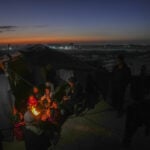 Winter is hitting Gaza and many Palestinians have little protection from the cold
Winter is hitting Gaza and many Palestinians have little protection from the cold
 China calls Taiwan a 'red line', criticises new US military aid to island
China calls Taiwan a 'red line', criticises new US military aid to island
 Trump says he might demand Panama hand over canal
Trump says he might demand Panama hand over canal
 China's Nio says new Firefly EV to go on sale in Europe in H1 2025
China's Nio says new Firefly EV to go on sale in Europe in H1 2025
 Stellantis reverses Ohio layoffs weeks after CEO's abrupt departure
Stellantis reverses Ohio layoffs weeks after CEO's abrupt departure
 Howard throws 2 TD passes to Smith to help Ohio State rout 42-17 in College Football Playoff
Howard throws 2 TD passes to Smith to help Ohio State rout 42-17 in College Football Playoff
 JuJu Watkins and No. 7 USC hold off Paige Bueckers and fourth-ranked UConn 72-70
JuJu Watkins and No. 7 USC hold off Paige Bueckers and fourth-ranked UConn 72-70
